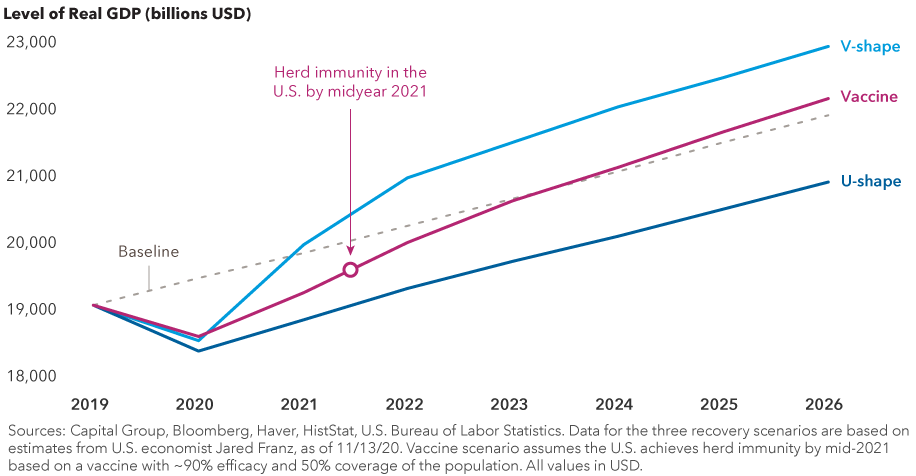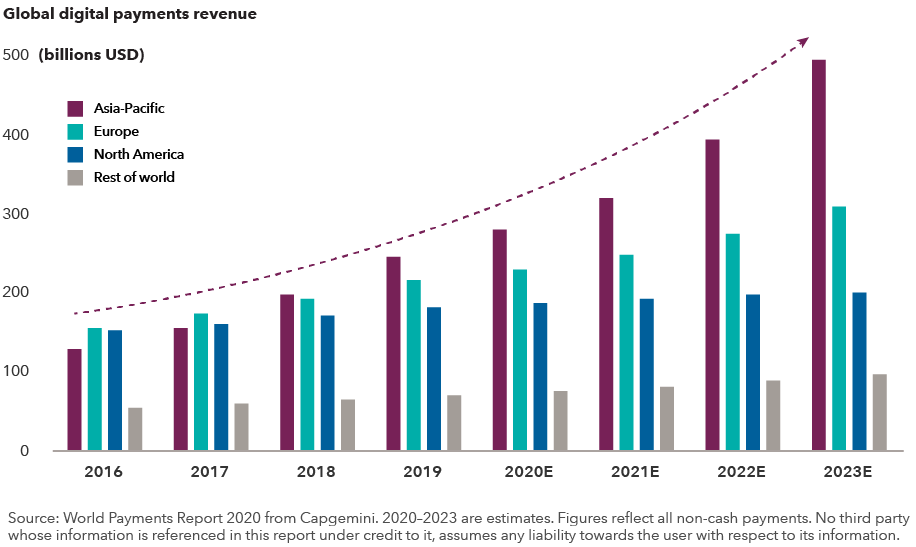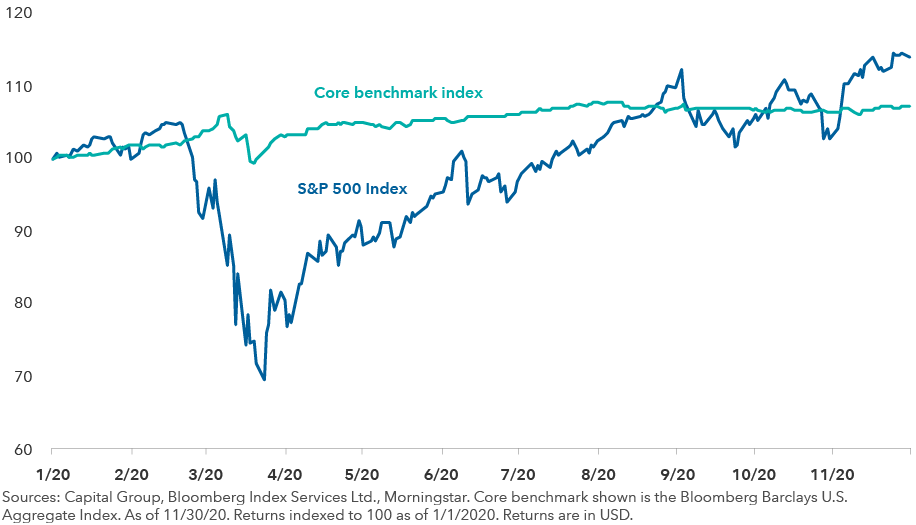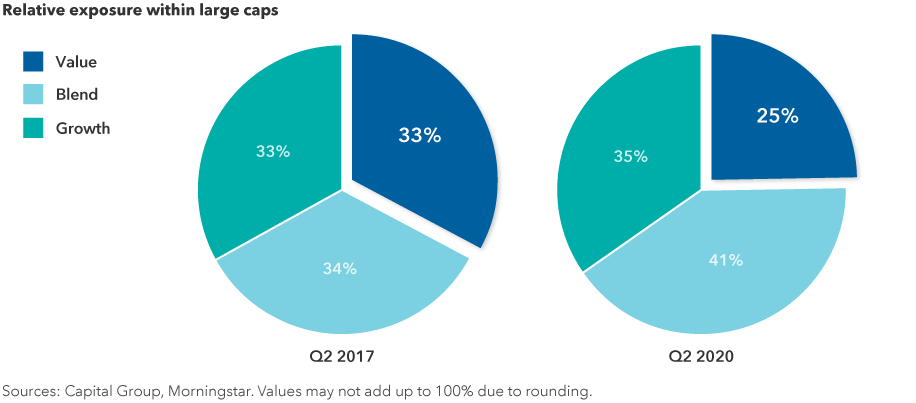by Mark Casey, Jared Franz, and Jody Jonsson, Capital Group
Last year was like no other as COVID-19 disrupted lives, the global economy and markets. Here are five key themes to help navigate an uncertain year ahead.
As we turn the page on a year like no other, we all hope for the return of old-fashioned normalcy in 2021. But as any experienced investor knows, normal rarely translates into predictable. If anything, 2020 — with its deadly pandemic, global recession, stunning market collapse and surprisingly rapid recovery — reinforced the notion that it’s impossible to know exactly what lies around the bend.
Time will tell when we’ll all feel comfortable heading out to dinner and a movie with friends again or hopping on a flight to the Caribbean, but investors can prepare themselves for the inevitable twists and turns in the markets. Here are five key themes to consider as you set expectations for the year ahead.
1. Look for stronger growth as pace of vaccine rollout accelerates
In the closing days of 2020, the U.S. Congress passed legislation providing US$900 billion for COVID relief, just as earlier benefits were set to expire.
The relief measures include support for small businesses, direct payments to individuals, extended unemployment benefits, and funding for vaccine development, distribution and education support.
“With the benefit of seeing the pandemic play out in real time, lawmakers did a better job of matching need with funding than they did with the initial CARES legislation,” says U.S. economist Jared Franz.
Although these measures will provide a partial offset to the slowdown in late 2020, until COVID-19 is contained it will continue to impact near-term growth. “All growth forecasts depend on the trajectory of the vaccines,” Franz adds. While administration of the vaccines got off to a slow start in the U.S., the pace picked up meaningfully in the early days of the new year, said Franz. “A further pickup in the pace of distribution could drive U.S. GDP growth above 3% in 2021, with growth concentrated in the second half of the year.”
The strength of the recovery is vaccine dependent
2. Tap into the digital future
A COVID-induced acceleration of digital life is reshaping the U.S. economic landscape, changing consumer habits and expectations, and altering the competitive landscape for entire industries.
Sure, people were shopping and accessing health care services online before COVID, but the pandemic has amplified demand and created new opportunities for investors and digitally savvy companies. Companies with fast and efficient online business models are soaring above the terrestrial competition, disrupting the status quo and displacing old-economy stalwarts. This broad-based investment theme crosses many key sectors, from retailing and entertainment to advertising and payment processing. Even the fitness industry is getting a vigorous digital workout.
Companies with strong online business models have an advantage
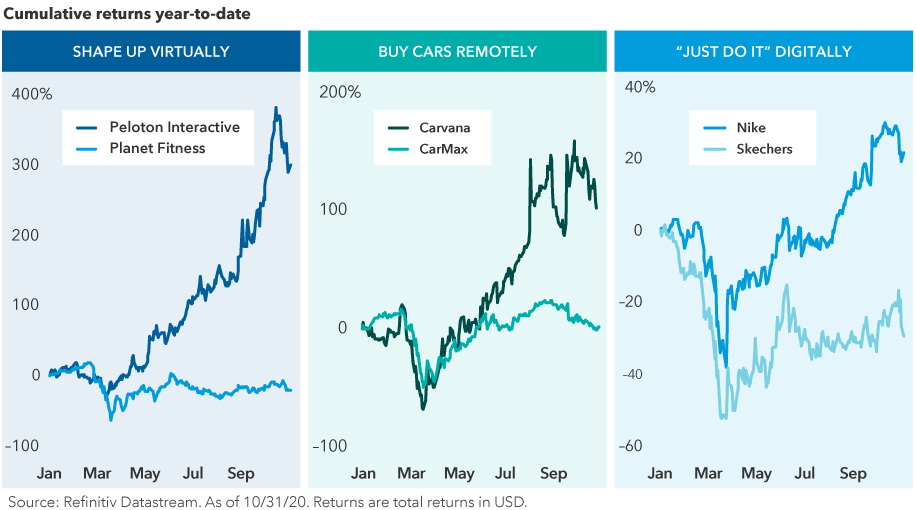
The question for investors is which of these trends are long lasting and which will fade along with the impact of the virus.
”I'm hopeful that lockdowns will be fleeting, but many of the digitization trends that were accelerated by COVID — the shift to online commerce, online doctor’s appointments and the migration to internet TV — I think all those trends are going to endure,” says equity portfolio manager Mark Casey. “People formed new habits in 2020, and those habits are going to be sticky.”
Indeed, Casey formed a new habit of his own in 2020: adopting digital payment technology on his smartphone rather than reaching for his wallet to pay cash. “I didn't want to learn how to use the tap-and-pay feature, but I made myself learn it, and I'm not going back.”
To be sure, digital acumen doesn’t automatically translate into success for companies. “There will be winners and losers,” Franz says. “Our job is to identify them — finding the growing companies that have not only benefited from the pandemic but also have the potential to continue generating solid growth in a post-pandemic world.”
3. In the search for innovative companies, go global
The U.S. has long been considered the global leader in innovation, with its cutting-edge companies, robust venture capital system and high-tech infrastructure. But to think of innovation as an exclusively U.S. story would be a mistake.
The tap-and-go payments app that Casey started using last year? He’s just now catching up to millions of consumers in China, South Korea and other Asian countries who have been using this technology for years. In some emerging markets not long ago, many people didn’t have bank accounts, but they did have mobile phones — and that led to faster adoption of mobile payments.
Simply put: Cash is no longer king, especially outside the U.S. “A decade from now, I think digital payments will be the norm and people will give you odd looks if you try to pay with cash,” says equity portfolio manager Jody Jonsson.
Asia has become the world leader in digital payments
These days, Asia and Europe lead the world in some of tomorrow’s technology, including renewable energy as well as digital payments. This serves as one more reminder why investment opportunities in international and emerging markets shouldn’t be ignored. Although the U.S. is likely to remain a primary engine for innovation, it would be shortsighted to think of it as the sole province of inventive companies. What’s more important for investors is to seek out the world’s most innovative companies in growing industries wherever they are located.
4. Hold onto strong core bonds, even when rates are low
There are plenty of reasons to forget 2020. But there is one thing that investors would be well served to remember: The fastest equity market decline in history showed how important it is to continue to hold high-quality bonds as a buffer to market volatility.
During the deep equity correction, as the Standard & Poor’s 500 Composite Index plummeted more than 30% in USD, the Bloomberg Barclays U.S. Aggregate Bond Index, a typical benchmark for core bond funds, did exactly what it was supposed to do: hold steady during times of turbulence. It declined only a few percentage points during the worst of the crisis and recovered much more quickly than the stock market. Even as equities have recovered, bonds have held up. It’s important to remember, past results are not predictive of results in future periods, but they provide an important perspective.
Although interest rates will likely remain at ultralow levels for some time, strong core bond allocations can continue to be a crucial buffer against volatility.
“No matter the environment, a high-quality core bond fund is critical to act as ballast and fortify your portfolio,” says Mike Gitlin, head of fixed income at Capital Group. “While total returns may be more modest in the coming years, the need for diversification, capital preservation, income and inflation protection in a balanced portfolio hasn’t decreased.”
The core bond benchmark held steady as stocks sank
5. Maintain balance in your portfolio
Returns for consumer tech and digital companies have dwarfed those of most other industries over the last decade — a trend that was amplified in 2020 as consumers adapted their behaviours amid the COVID pandemic. So, it’s probably no surprise that these market leaders account for an increasingly larger share of many investors’ portfolios, and it may be time to rebalance.
Capital Group’s Portfolio & Analytics team recently reviewed more than 4,000 portfolios of U.S. investors and found that investors significantly reduced allocations to value equities over the last three years. The message isn’t to avoid growth stocks, but rather to ensure that they haven’t outgrown their intended position and role in a portfolio. Indeed, after years of being overlooked, many dividend stocks now trade at attractive valuations.
The start of a new year gives financial professionals a great opportunity to check if their clients’ equity holdings are still aligned with their long-term goals.
Investors have scaled back their exposure to value funds
About
 Mark Casey, Portfolio manager
Mark Casey, Portfolio manager
Mark Casey is a portfolio manager with 20 years of investment industry experience, all with Capital Group. He holds an MBA from Harvard and a bachelor's from Yale.
 Jared Franz, Economist
Jared Franz, Economist
Jared Franz is an economist covering the U.S. and Latin America. He has 14 years of investment industry experience. Prior to joining Capital in 2014, Jared was head of international macroeconomic research at Hartford Investment Management Company and an international and U.S. economist at T. Rowe Price. He holds a PhD in economics from the University of Illinois and a bachelor's from Northwestern.
 Jody Jonsson, Equity portfolio manager
Jody Jonsson, Equity portfolio manager
Jody Jonsson is an equity portfolio manager 31 with years of investment experience, 29 at Capital. She holds an MBA from Stanford and a bachelor's from Princeton. Jody is a CFA charter holder and a member of the CFA Institute.
Commissions, trailing commissions, management fees and expenses all may be associated with mutual fund investments. Please read the prospectus before investing. Mutual funds are not guaranteed, their values change frequently and past performance may not be repeated.
Unless otherwise indicated, the investment professionals featured do not manage Capital Group‘s Canadian mutual funds.
References to particular companies or securities, if any, are included for informational or illustrative purposes only and should not be considered as an endorsement by Capital Group. Views expressed regarding a particular company, security, industry or market sector should not be considered an indication of trading intent of any investment funds or current holdings of any investment funds. These views should not be considered as investment advice nor should they be considered a recommendation to buy or sell.
Statements attributed to an individual represent the opinions of that individual as of the date published and do not necessarily reflect the opinions of Capital Group or its affiliates. This information is intended to highlight issues and not be comprehensive or to provide advice. For informational purposes only; not intended to provide tax, legal or financial advice. We assume no liability for any inaccurate, delayed or incomplete information, nor for any actions taken in reliance thereon. The information contained herein has been supplied without verification by us and may be subject to change. Capital Group funds are available in Canada through registered dealers. For more information, please consult your financial and tax advisors for your individual situation.
Forward-looking statements are not guarantees of future performance, and actual events and results could differ materially from those expressed or implied in any forward-looking statements made herein. We encourage you to consider these and other factors carefully before making any investment decisions and we urge you to avoid placing undue reliance on forward-looking statements.
The S&P 500 Composite Index (“Index”) is a product of S&P Dow Jones Indices LLC and/or its affiliates and has been licensed for use by Capital Group. Copyright © 2020 S&P Dow Jones Indices LLC, a division of S&P Global, and/or its affiliates. All rights reserved. Redistribution or reproduction in whole or in part are prohibited without written permission of S&P Dow Jones Indices LLC.
FTSE source: London Stock Exchange Group plc and its group undertakings (collectively, the "LSE Group"). © LSE Group 2020. FTSE Russell is a trading name of certain of the LSE Group companies. "FTSE®" is a trade mark of the relevant LSE Group companies and is used by any other LSE Group company under licence. All rights in the FTSE Russell indices or data vest in the relevant LSE Group company which owns the index or the data. Neither LSE Group nor its licensors accept any liability for any errors or omissions in the indices or data and no party may rely on any indices or data contained in this communication. No further distribution of data from the LSE Group is permitted without the relevant LSE Group company's express written consent. The LSE Group does not promote, sponsor or endorse the content of this communication. The index is unmanaged and cannot be invested in directly.
Bloomberg® is a trademark of Bloomberg Finance L.P. (collectively with its affiliates, "Bloomberg"). Barclays® is a trademark of Barclays Bank Plc (collectively with its affiliates, "Barclays"), used under licence. Neither Bloomberg nor Barclays approves or endorses this material, guarantees the accuracy or completeness of any information herein and, to the maximum extent allowed by law, neither shall have any liability or responsibility for injury or damages arising in connection therewith.
MSCI does not approve, review or produce reports published on this site, makes no express or implied warranties or representations and is not liable whatsoever for any data represented. You may not redistribute MSCI data or use it as a basis for other indices or investment products.
Capital believes the software and information from FactSet to be reliable. However, Capital cannot be responsible for inaccuracies, incomplete information or updating of the information furnished by FactSet. The information provided in this report is meant to give you an approximate account of the fund/manager's characteristics for the specified date. This information is not indicative of future Capital investment decisions and is not used as part of our investment decision-making process.
Indices are unmanaged and cannot be invested in directly. Returns represent past performance, are not a guarantee of future performance, and are not indicative of any specific investment.
All Capital Group trademarks are owned by The Capital Group Companies, Inc. or an affiliated company in Canada, the U.S. and other countries. All other company names mentioned are the property of their respective companies.
Capital Group funds and Capital International Asset Management (Canada), Inc. are part of Capital Group, a global investment management firm originating in Los Angeles, California in 1931. The Capital Group companies manage equity assets through three investment groups. These groups make investment and proxy voting decisions independently. Fixed income investment professionals provide fixed income research and investment management across the Capital organization; however, for securities with equity characteristics, they act solely on behalf of one of the three equity investment groups.
The Capital Group funds offered on this website are available only to Canadian residents.
Copyright © Capital Group






